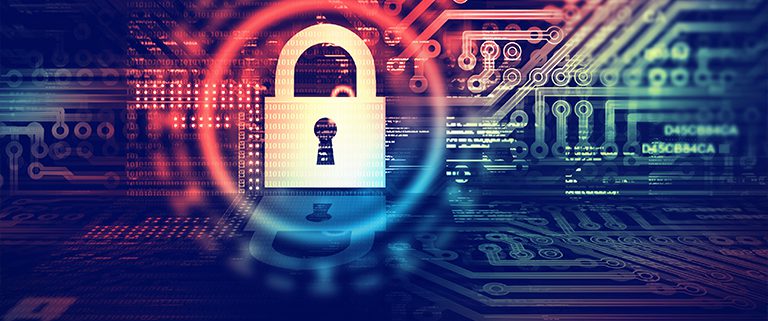By Paul Wesslund
This month, electric cooperatives across the country are joining forces to raise awareness about cybersecurity. We hope you will join us in taking action and recognizing October as National Cybersecurity Awareness Month.
Electric co-ops protect the private information of members and ensure hackers don’t tamper with the reliability of the electric grid, but consumers have a lot at stake, too. Think about losing all the photos on your smartphone or having bank or credit card information stolen from your computer.
Cyber criminals all over the world are on the prowl through the internet and they’re getting better at what they do, according to the team of cybersecurity experts at the National Rural Electric Cooperative Association.
“The bad guys tend to be a step ahead and we’re always going to be playing catch-up, so you’re never going to be 100 percent secure,” says Barry Lawson, a senior director of regulatory affairs at NRECA. “But it’s not something to be afraid of. There are basic steps people can take to provide good layers of protection.”
Lawson, along with two other NRECA cybersecurity specialists, Cynthia Hsu, cybersecurity program manager, and Bridgette Bourge, senior principal for legislative affairs, recently discussed steps consumers can take to protect themselves and their valuable data.
They suggest thinking of cybersecurity as cyber hygiene. “Just like washing your hands will help keep you from getting bacteria,” Bourge says, “there are simple things you can do to protect yourself online.”
The first step is to make cyber hygiene a habit, Hsu says. She advises people at work and in their homes to incorporate basic security steps into their daily mindset.
Here are the top tips for protecting yourself from internet danger at work and home, as recommended by the NRECA experts:
1. CREATE A STRONG PASSWORD: If it seems difficult to keep up with all the passwords for the different software and applications you use, at least focus on the main passwords that allow the primary internet access, like the ones that open your computer, phone and wireless router. Make it complicated with a mix of upper- and lower-case letters, numbers and special characters like “%” or “&.” Remember to change the password at least every six months.
2. KEEP SOFTWARE UPDATED: Notices of updates don’t just add flashy features to your apps, they often add security patches to protect against new security threats. Updates usually come automatically from the software company, whether it’s for the computer, mobile device operating system, one of the many functional apps, like Facebook, or a link to your favorite sports team. But take a level of caution on updates as well. You can check regularly for updates either from your device or by going to the application’s website. Be suspicious of update notices that arrive by email, especially if they claim to require urgent action. Visit the application’s website to make sure the update is legitimate.
3. DON’T CLICK ON ANY LINK OR ATTACHED FILE UNLESS YOU KNOW WHERE IT WILL TAKE YOU: A lot of the computer hacking problems you hear about in the news result from people clicking on links or attached files that infect their computers or mobile devices. An email can even be disguised to look like it’s coming from your best friend, so simple diligence can be extremely beneficial. Take a moment and move your cursor over a link to reveal the full address before clicking it. You’ll see a lot of confusing symbols, but you should also be able to recognize the name of the legitimate source. If you don’t, find another way to verify the link.
4. INSTALL AND USE VIRUS PROTECTION: Buy your antivirus software from one of the major recognized companies and make it a subscription-type service that regularly sends automatic updates.
5. DON’T USE FLASH DRIVES: Those little thumb drives or jump drives you insert into your USB port may be handy ways to share lots of photos or other large documents, but as your mother might say, you don’t know where they’ve been. These portable memory devices are another common way computers get infected with damaging software. Instead, learn to use Dropbox or other software solutions for transferring large files.
6. BACK UP YOUR DEVICES: Make sure you have a current copy of everything on your computer or mobile device. Every few weeks, transfer your contents to an external storage system that you then unplug from your computer. You can buy an external hardware drive or online storage designed just for this purpose. Think of it this way: What if your computer or phone were lost or stolen? Recent computer attacks involve ransomware that locks your computer and threatens to delete or prevent access to everything on it unless you pay a ransom to the hackers. The hackers might not unlock it even after a ransom is paid. If you suffer a ransomware attack, you might need to take your computer to a professional to wipe everything off your hard drive and start over. But with a backup you will be able to restore your most valuable documents.
7. SECURE ALL YOUR INTERNET-CONNECTED DEVICES: Hackers started invading wireless printers and baby monitors that work through the internet. These devices tend to have extremely weak, preset passwords that you probably don’t even notice. Read the instructions carefully, set good passwords, keep the devices updated and make sure any wireless routers in your home are secure as well. Any internet-connected device — smart televisions, cameras, voice-activated speakers, thermostats, video games, fitness bracelets, internet-connected refrigerators and lightbulbs — is vulnerable.
8. PROTECT THE KIDS: Don’t forget that children also need to be aware and practice good cyber hygiene. They should know not to send out such information as birthdates and other ID numbers, as well as details like how long the family will be away on vacation. Learn to use parental control options on your hardware and software.
To learn more about National Cybersecurity Awareness Month and to view additional cybersecurity tips, visit www.staysafeonline.org.
Paul Wesslund writes on cooperative issues for the National Rural Electric Cooperative Association.


